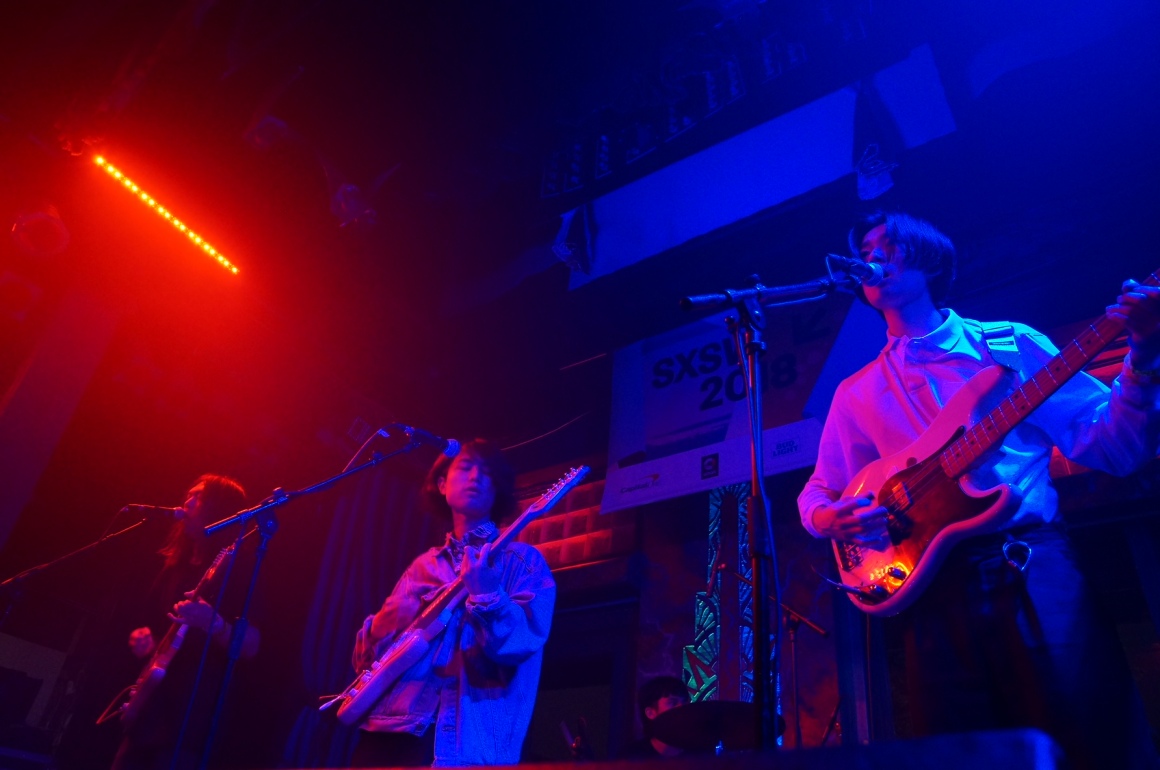
“We wear denim jackets and jeans but no one asks us, ‘Why don’t you wear Kimonos? ’ So why ask, ‘Why do you sing in English?’ This is just our own way. Not as Japanese, but as ‘DYGL’.”
— Nobuki Akiyama
Tokyo indie punk band DYGL has been on our radar ever since the summer of 2015, when the band first came to America and played one of their first American shows at the old location of Lolipop Records. No different from any other indie kids in LA, they seemed to blend in with the crowd and did a few songs with rather bad live sound. Back then, only one self-released EP was available on the Internet along with some Razorlight covers. They quickly gained steam though. Soon after Ykiki Beat – predecessor band with three DYGL members in it – went on hiatus in 2016, DYGL took off, with their unique retro-punk sound setting them apart from the hundreds of city-pop bands in the Japanese indie music scene.
These days, it is increasingly common for Japanese bands to extend their career overseas, so naturally, the clash of cultural identity and foreign recognition has become a hot topic. This year at SXSW, I was able to talk with many Japanese bands about self-awareness, and I’ve never met a band more comfortable with themselves than DYGL. Level-headed and determined, they know exactly what they want, or at least know how to decide what they want. For this interview, we were honored to have lead singer Nobuki Akiyama and guitarist Yosuke Shimonaka discuss their latest work and next steps, as well as their views about politics and social media. If you didn’t know these dudes before but liked what they had to say, check out their music too. You won’t be disappointed.

KKS: How has your SXSW experience been? Have you made any new friends yet? I’m sure you’ve already seen some shows. Among the artists performing this year, is there anyone you would like to collaborate with?
Akiyama: We did two shows already and it feels it’s still warming up, but we were able to see endless shows of our favorite bands. Last year we came too but this year is our first time coming as an official performing band. Although we like to make new friends, this time we are just hanging out with some guys we already know. This time we found a band called “Omni”. I’ve only listened to a few of their songs but last night we saw them at one of the stages at Hotel Vegas. They are really cool, but I don’t know – if we really want to “collaborate” with any bands. We really don’t know. We are happy to be here already.
KKS: DYGL have released “Say Goodbye to Memories Den” last year. How was the cooperation with Albert Hammond Jr. and his team? Have you picked up any guitar lines from Albert? I did hear some Nick Valensi in your guitar by the way…
Shimonaka: Actually Albert did not touch our guitar phrases. Mainly he made our sounds and arranged the song structure but we wrote our own guitar phrases.
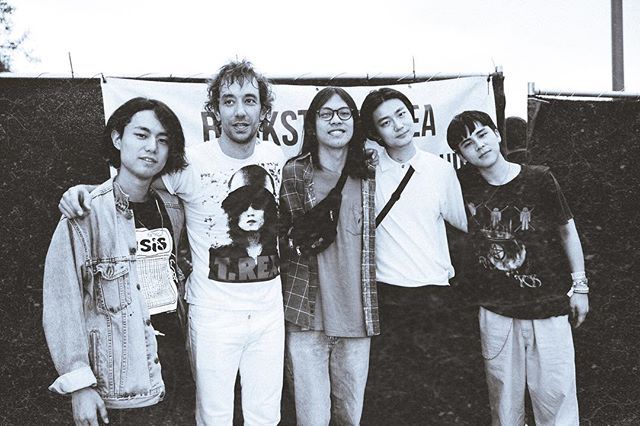
(Photo by: Erina Uemura)
KKS: I noticed some lyric changes in your album from the original release – For example in the song “All The Time” (in album version the name is “All I Want”) there was one line where you sang “All I want is to marry with an American girl” while in the album version you change the sentence to “All I want is to make a little noise in this world”. I was in fact a little disappointed because a long time ago Shimonaka told me “American girl” was a metaphor for the Statue of the Liberty. Was this Albert’s suggestion or your own idea?
Akiyama: It was my own idea. People who don’t know may think, “Why do you say that?” There wasn’t enough background to make that implication. I don’t want people to judge us as “easy” just by the words. When I rewrote the song, I did feel that line needed to be changed considering the song’s whole image.
Shimonaka: Albert didn’t care about lyrics that much.
Akiyama: He cared more about the sound itself than meanings. I tried to ask him for opinions on lyrics several times but he didn’t seem to care.
KKS: When I listened to his solo music I thought the lyrics sound poppy but I did like his tunes a lot.
Akiyama: This is probably his style. He cares more about the sound.
KKS: Production-wise, how does the album compared with the new single, which is produced by Rory Attwell?
Shimonaka: I prefer the simple sound – more garage, lo-fi than it to be clean. Rory would use some noise effects to make our music sound fuzzy. That’s the big difference.
KKS: I read that Rory Attwell’s style is to make the band perform live and record it. Did he do it with this single as well?
Akiyama: Actually for this single we recorded separately from drums to bass…one by one. However we did do live recording on the full album. It’s really tricky because the album sounds cleaner and more modern.
KKS: Your answer reminded me of the sound of Ykiki Beat’s album, which I thought was produced very clean.
Akiyama: I can’t agree with you. I believe the impression may have been made based on the song because Ykiki’s songs are usually quieter while “Bad Kicks” is more aggressive, which may have caused that impression. It’s good to try out different producing styles with different songs. With that being said, I want to pursue a more “Rory way” for the new album because it’s closer to our image – natural and real.

KKS: DYGL had an Asia tour last summer. How was it? Why do you think you can attract a bigger crowd over there than in other countries considering your music style (more western)?
Akiyama: (Laughs) That’s a good question. I wanted to ask someone too. Maybe because we are rare – as a Japanese band singing in English touring in Asia. I don’t know any other band that does that. More importantly I’d like to believe people there (in Asia) are simply attracted to our music. If they like our music, that’s the best.
KKS: Especially in China, you guys are huge as an indie band. Trust me, you have quite a few fan girls over there. Do you think you can copy the kind of success here in America?
Akiyama: Yeah. It’s probably not like the time when we first met at Lolipop records anymore…but I didn’t know we were “huge” in China. Of course if you say so we’re really glad to hear it. We can’t really control who comes to our shows but people behave differently in different countries. Japan is quite unique (laughs). Maybe next time we will go to places like South Africa or Russia and see people’s reactions.
KKS: That’s actually my next question: Where would you most want to play next?
Akiyama: France? I’m not sure. Comparing with “what country” I’m more interested in “what event”. We really want to play in big music festivals. SXSW is an example but SXSW is something else you know? Everyone plays in separate venues. We’ve played at some proper Japanese festivals like FUJI Rock Festival but outside of Japan we haven’t got a chance yet. We’d love to make a festival appearance in Europe.
KKS: You mentioned you wanted to move to somewhere else to do music. That’d be England I guess?
Shimonaka: That’s right! London.
Akiyama: We want to be at somewhere not too huge. London is proper. New York might be too huge. I like New York too but London may suit us better.

KKS: What do you think is the biggest barrier for DYGL to become part of foreign indie scene? What’s the key to make the band stand out from all the other underground artists beside your nationality?
Akiyama: We are just feeling comfortable talking with new people and doing some shows. There could be some barriers, but all indie bands have similar barriers too. It’s really not just us. America is enormous (for bands to be recognized). I never think it’s because we are Japanese that we have such difficulties. It’s difficult for everyone.
Shimonaka: It’s the music that matters. Not where you are from. We are original. It is important to be yourself. I see a lot of bands imitating the classics but they do not hit my soul. These bands should really show more of their own souls in their music.
KKS: What’s your thought on the conflict within Japanese indie scene regarding whether the music should be made in a western style? (As you may know, some Japanese bands such as Kikagaku Moyo have very strong opinions about English-lyric bands.)
Akiyama: We’ve been asked this question so many times and we really need to come up with a good answer for this (laughs). I just like British and American music that’s all. 14-year-old me decided to sing in English and I just kept doing it. Recently, I started to realize the difference between singing in English and Japanese. I could sing in Japanese. That’d be very interesting. I can write Japanese lyrics but I would not use them in DYGL.
Shimonaka: Some people ask us “Why do you sing in English? Aren’t you Japanese?” while some others say “It’s great that you sing in English”. It’s totally depending on the audience. Like I said earlier, it’s important to feel comfortable to do what you want to do.
Akiyama: We are not “singing English as Japanese people”, but more “as us”. Being Japanese is important, but before that, I am “MYSELF”. It’s interesting that we wear denim jackets and jeans but no one asks us, “Why don’t you wear Kimonos?” So why ask, “Why do you sing in English?” This is just our own way. Not as Japanese, but as “DYGL”.
Shimonaka: The thing about music is the language doesn’t matter. If you sing “Enka” (A traditional Japanese music style) in English…You can try…
Akiyama: It’d be really experimental though (laughs).
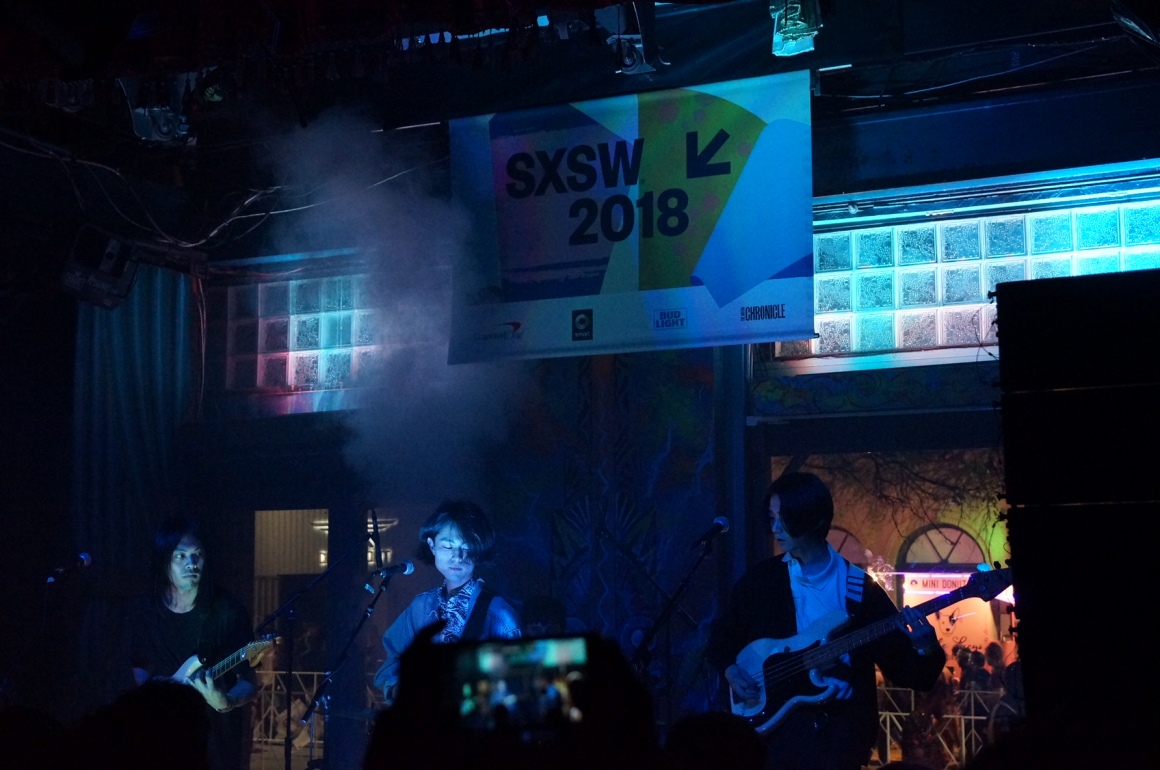
KKS: What do you think about social media? Nowadays everyone seems to be addicted to Instagram and Snapchat – Is it a good thing or bad thing?
Akiyama: I LOVE IT! Nah just kidding. It’s really a love-hate relationship. It could be a problem when people put their life on a display. Connecting with people 24/7 is stressful. Besides it’s important to see people standing on their feet and looking into each other’s eyes. They fight. They love. They stop seeing things through a filter. On the other hand, it opens doors to a different world whereas in the past it took time to get your message out.
Shimonaka: It’s so ANNOYING. It’s freaking annoying.
Akiyama: It’s scary because you cannot be completely offline. Even if you threw away your phone, someone else could still shoot your picture and put it online.
KKS: I sometimes see you (Akiyama) comment on political or social issues on Facebook – I also noticed DYGL did a few shows to raise social awareness. Do you think rock music, especially punk music should be political? How should musicians react to political issues in the world?
Akiyama: We are just a band. We don’t want to be too political. We are dealing politics, friendship, love and all these things equally. Let’s not avoid it but just think about it just as another thing in your life on the same level as everything else. Politics is no more than just part of life. The thing is, in Japan not many people are as involved, so we may look a bit more political than others. In America it’s a common thing for musicians to get involved.
Shimonaka: We went to a Bernie Sanders campaign with Vampire Weekend playing but had to go before they were on to play a show in Philadelphia.
KKS: So you’re saying in your life, politics, love, friends, music…these are all equal.
Akiyama: Yes, and American girls (laughs). Well, at least I want them to be all equal. I don’t dare to avoid politics. I don’t dare to avoid any of these. The dynamic of how young Japanese people involve themselves in political issues is changing. You wouldn’t see some of today’s protests organized by youngsters ten, twenty years ago. I have a college friend who organized a big protest recently but still, Japanese people have mixed feelings – almost like allergies towards these campaigns. We try to be cautious.
KKS: Please choose an artist or a band that you would like to recommend to us from each decade. 60s, 70s, 80s, …
Akiyama: I’m trying to be creative on this question but I just can’t. My favorite for the 60s is the Beatles but I’m listening to a band called Herman’s Hermits.
Shimonaka: For the 60s I would choose the Pretty Things. They sound like psychedelic Beatles…Wait I know what you want to say! They do it in a different way. They are not as “catchy” compared to the Beatles but they are very inspiring. And there is one important thing that I need to clarify before we go to the seventies – the Pretty Things are not influenced by the Beatles. They lived in the same era. Now that we know this fact, I have a really good one for the seventies.
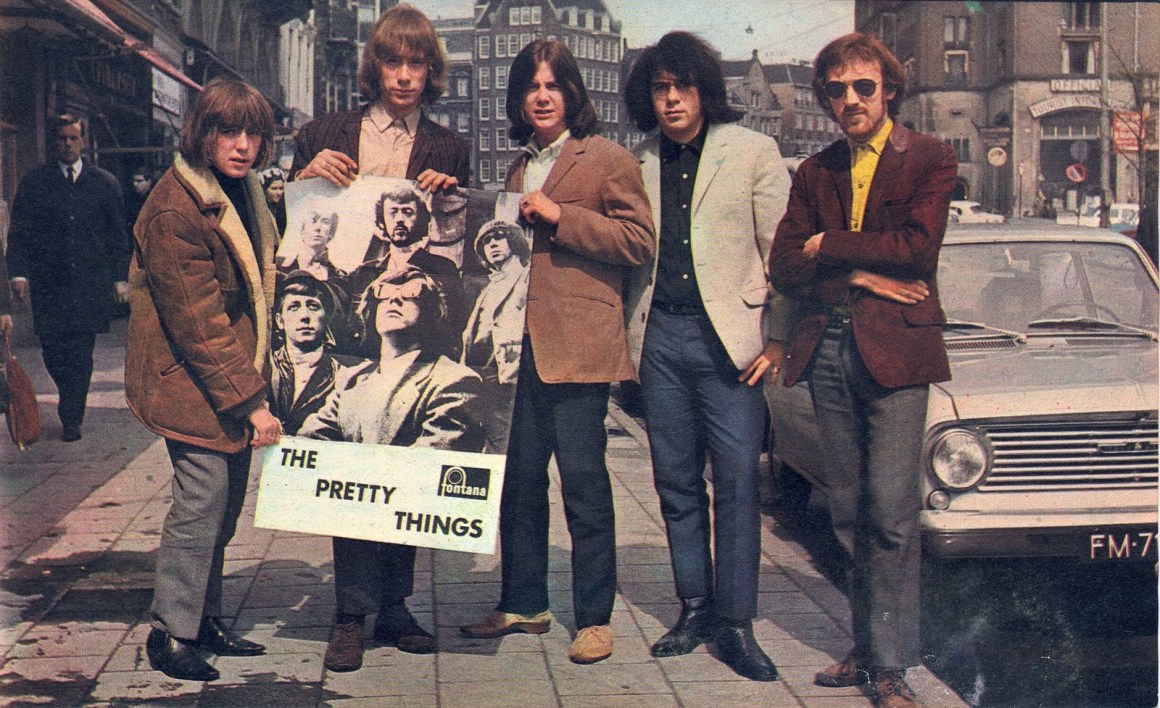
Akiyama: Television are from the 70s, no?
KKS: Yes they are. I just saw their New Year Eve’s show at Bowery Ballroom. It was fantastic.
Akiyama: Really? That’s a proper venue! Television played in Japan too but at a really strange venue so no one had really thought it could be the real Television.
Shimonaka: Their opening band was a high school kid band by the way. But my answer for the 70s is not Television. The name is Robert Lester Folsom. I always play his song in my house. He has a Neil Young vibe. A bit folk or let’s say, AOR. He makes simple songs but adds weird spices.
Akiyama: My choices for the 70s may be the Clash. Ah. My answers are all too typical! The Smiths, Oasis, and the Libertines.
Shimonaka: Michael Jackson for the 80s. Maybe Nirvana for the 90s? Wait, it’s gonna be Oasis. What about the 2000s? It’s really hard.
Akiyama: The Libertines. The Libertines…Oh there’s one more band called Little Man Tate. They are one of my favorites.

KKS: Since our website’s name is “Kawaii Kakkoii Sugoi”, can you please tell us which member respectively in DYGL you think is Kawaii, Kakkoii or Sugoi (Cute, Cool, or Awesome)?
Shimonaka: I think it’s me! For all three!
Akiyama: (Points at Shimonaka while nodding) Yep.
DYGL is playing two sold out shows with American band Beach Fossils this week in Osaka and Tokyo.
DYGL × BEACH FOSSILS
OSAKA 3/27 UMEDA SHANGRI-LA (SOLD OUT)
TOKYO 3/28 SHIBUYA CLUB QUATTRO (SOLD OUT)
閱讀此文中文入口:點擊這裡
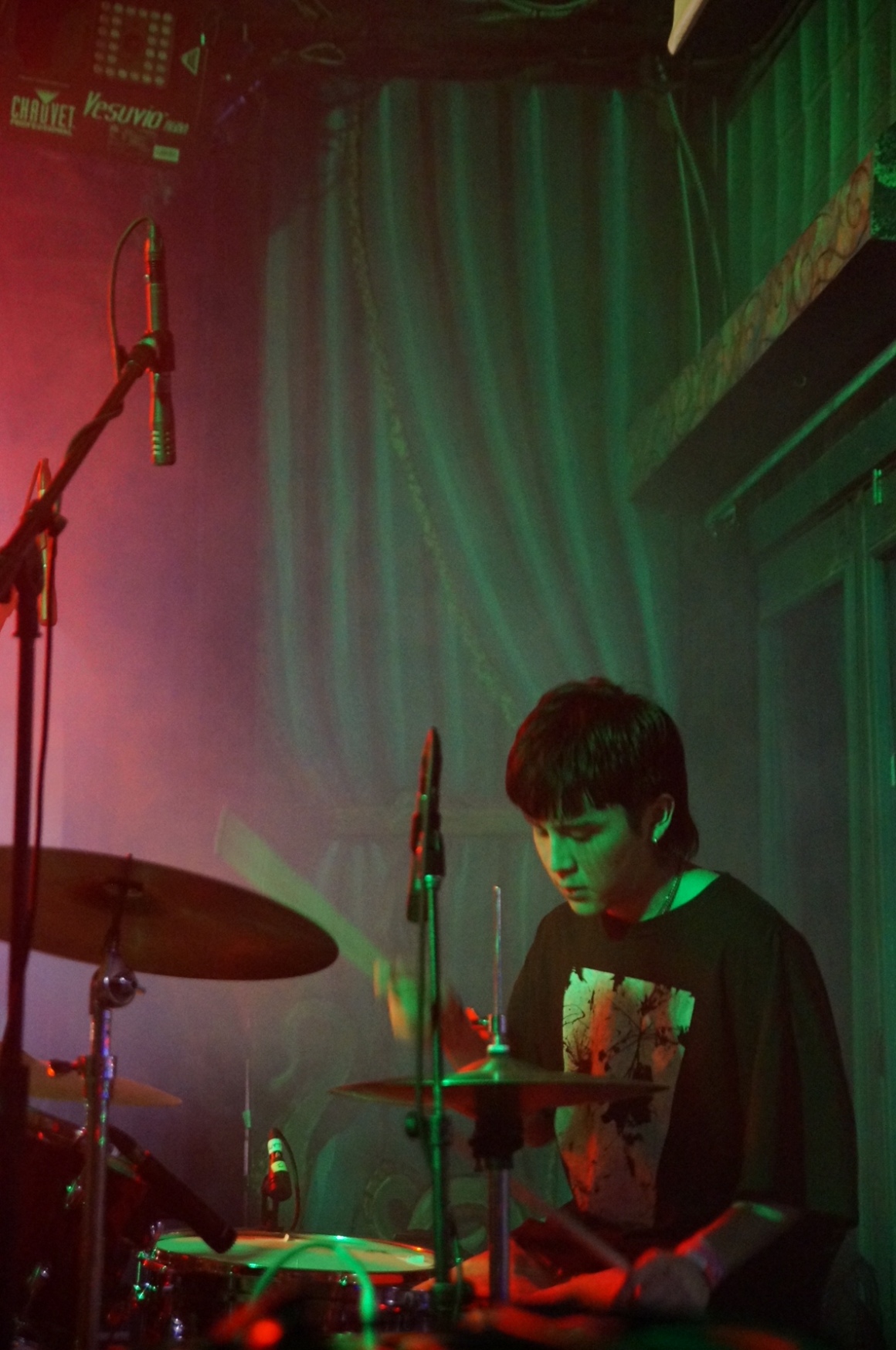

0 Comments